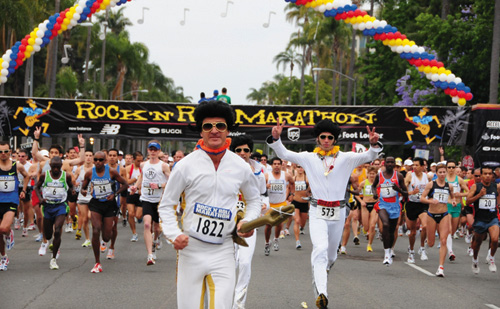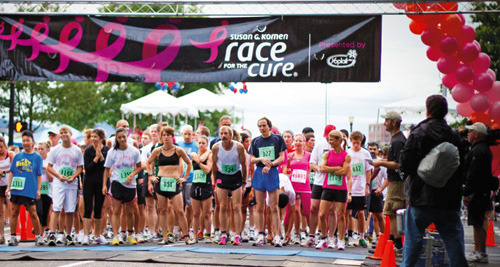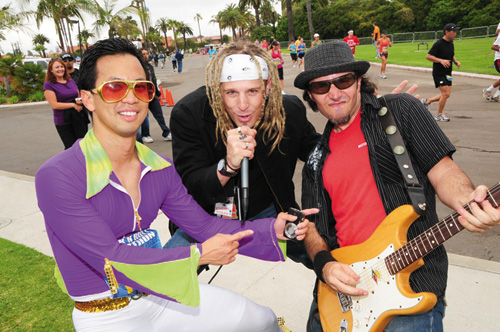 In March, the San Diego-based Competitor Group announced it would bring its popular Rock ’n’ Roll Marathon Series to Portland next May. The reaction was less enthusiastic among local companies that manage races in the area.
In March, the San Diego-based Competitor Group announced it would bring its popular Rock ’n’ Roll Marathon Series to Portland next May. The reaction was less enthusiastic among local companies that manage races in the area.
 |
Above: Wilsonville-based Hamilton Events operates three of Portland’s most popular races, including Race for the Cure.Below: San Diego-based Rock ’n’ Roll Marathon is bringing its popular marathon series to Portland next year, and its half-marathon will kick off the Rose Festival, drawing criticism from local companies that manage races. |
 |
 |
The hand stamp was quintessential Portland. A subversive shot across the bow of the U.S.S. Conformity captured in smudgy black letters: “Support Local Running. Boycott Rock ’n’ Roll Marathon.” It was a literal call to arms — imprinted on the wrists of participants in April’s “Bridge to Brews” awaiting entry into the post-race beer garden — expressing indignation over outside infiltration into the local running market.
In March, the San Diego-based Competitor Group announced it would bring its popular Rock ’n’ Roll Marathon Series to Portland next May. Moreover, the half-marathon will serve as the official kick-off event for the 2012 Portland Rose Festival.
“This will instantly boost the Rose Festival brand and the Rose Festival’s impact,” Rose Festival executive director Jeff Curtis said at a March press conference. “We’re looking for this going out of the gate as a world-class running event.”
The reaction was less enthusiastic among local companies that manage races in the area. Terrapin Events, organizer of “Bridge to Brews” (and progenitor of the “boycott” stamp), has been the most overtly resistant.
“People can only run so many races,” says Melanie Mueller, Terrapin’s event and sponsorship coordinator. “Anything that is happening two weeks before or two weeks after stands to lose a lot of business and could eventually evaporate altogether.”
That includes her company’s annual Cinco de Mayo Half-Marathon. But underlying the potential loss of participant and sponsorship dollars is a more philosophical schism over Rock ’n’ Roll’s affiliation with the city’s trademark festival.
“It’s unfortunate that they couldn’t find a local option,” Mueller says. “It’s the Portland Rose Festival. It’s a celebration of local pride…and I don’t think bringing in a big outside company to do an event is really what this city is about.”
Sean Rivers, co-owner of the local Foot Traffic retail chain (which operates two races and co-sponsors several more), calls the Rock ’n’ Roll series a “convoluted, overpriced, money-making machine,” but allows that it will bring tourism dollars to the city.
“It’s fantastic for the hospitality industry,” Rivers says. “But you can get that locally. The Portland Marathon is a local race and it does the same thing.”
Of course, it’s taken the city’s signature race years to build that following. The effect of Rock ’n’ Roll brand recognition is expected to be immediate with the event estimated to draw more than 12,000 runners and inject as much as $20 million into the local economy, according to the Competitor Group.
“We have a very strong track record for delivering a significant economic benefit to local businesses,” Competitor Group president Scott Dickey says. “A rising tide lifts all boats.”
Dickey argues that the Rock ’n’ Roll series — a large-scale spectacle that will visit 25 cities next year — caters to a demographic of casual runners who are more likely to patronize local races after participating in a Rock ’n’ Roll event. Still, he’s no stranger to opposition.
“When you’re the 800-pound gorilla in the room, there’s going to be resistance,” Dickey says. “We understand that reaction. At the same time, it’s a little bit old hat to us.”
The debate doesn’t surprise Steve Hamilton, whose Wilsonville-based Hamilton Events operates three of Portland’s most popular races: the Shamrock Run, Starlight Run and Race for the Cure.
“In general, Rock ’n’Roll has a good reputation and Portland is a market that makes sense for them,” says Hamilton. “Yes, it will impact some of the local events but I think there’s room in this marketplace for everyone.”
NATHAN DINSDALE



